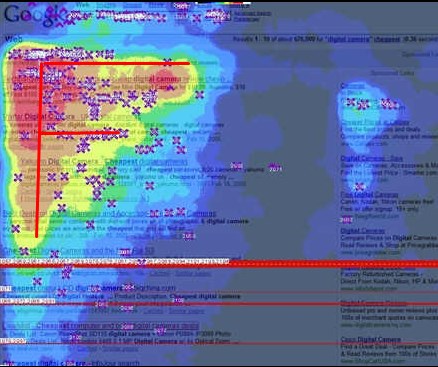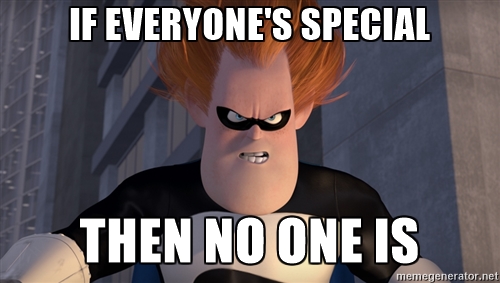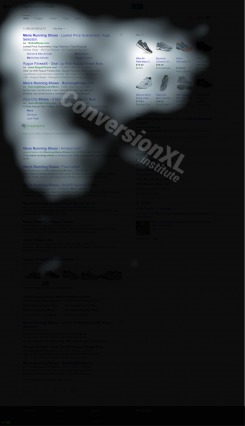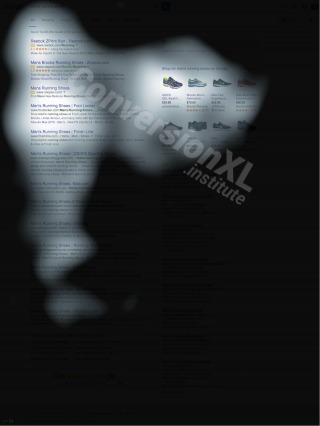With all the recent changes to Google’s desktop search results, it’s a good time to look at how these changes affect how we actually view search results. If you know that, you can decide where your hotel should focus its efforts in the world of search results, and how hard you’ll need to work to get those clicks.
New eye tracking studies have been released by Mediative and ConversionXL this year, and they tell us that the way we search today versus even two years ago is significantly different.
Which should your hotel focus on and why? Here are 3 tips you’ll learn more about:
- Focus on strong SEO for a high organic listing. Anything above the 4th position for your brand terms is a great place to be, as you’ll see later in the article.
- Use rich snippets to draw your potential guests’ eyes. Those can be knowledge panels, ads with call extensions, or other types of extensions on your paid ads.
- Format your paid search ads in the same way as an organic listing. If you look like an organic result, you’ll catch their eye.
Now let’s take a look at some answers, driven by the data. We’re looking at:
- Studies from a few years ago, to demonstrate how much things have changed in the past decade and even the past 2 years
- Important features to be aware of: F-patterns, knowledge panels and more
- Search patterns in 2016. How people look – and book! – on mobile and desktop, and what you should do to optimise.
Search Patterns Then
First, we’ll dip our toes into the past to take a look Mediative’s last eye tracking study, from 2014. They found that since 2005, changes like listings on the right side of the search page, carousel listings at the top, and knowledge panels had significantly affected the way we looked at search results on Google.
Knowledge panels are the panels that Google developed to enhance search results with information from a variety of sources – they can display for famous people, businesses, events and more. For hotels, they are particularly useful. They show a map with your hotel’s location, pictures, reviews, opening hours, your website, phone number, and more. They let potential guests “meet” your hotel one step earlier than they normally would.
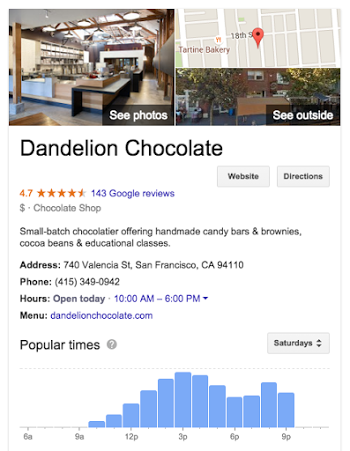
Before these new features, though, there was the time of the ‘Golden Triangle’ on Google. In 2005, the top left hand area of the page got a hugely concentrated amount of attention. This has been known as an F-pattern since the Nielsen Norman Group’s 2006 study. It refers to our tendency to look most at the upper left hand corner, and then directly across and below, decreasing as you scroll down.
Source: Search Engine Journal
Here’s a quick summary of Mediative’s findings in 2014:
- By 2014, since organic search results had been pushed down as Google started displaying ads first, the gaze also drifted down: prime real estate migrated down to positions 2-4
- The first organic result gets an average of 32.8% of clicks, regardless of new elements or the number of ads
- On mobile, we’re conditioned to scan vertically rather than horizontally, so the area our gaze focuses on is more of a line than a triangle
- By 2014, SEO was no longer one-size-fits-all – that’s even truer today. For a look at some of the most important parts of SEO, check out this guide.
- Paid search can garner views and attention, even if users aren’t necessarily clicking on them. They’re still good exposure for your brand!
- By 2014, people were looking at more search results, and looking at them faster (1.17 seconds per listing instead of 2). Interestingly, this time is longer on Bing. Users tend to be more familiar with Google’s layout and interface, so they’re able to get information more quickly.
Search Patterns Now
That’s your blast from the past. Now, let’s take a look at eye tracking today and what it means for your hotel:
Mobile:
Mediative’s 2016 study was entirely focused on mobile. They were looking to compare mobile and desktop, and see how important location on the SERP is to win clicks and views.
The key questions we’ll discuss are:
- Does the need to scroll impact negatively or positively on the number of clicks a result gets?
- How can you ensure people will see your hotel site?
Here’s what they found about mobile behaviour:
The #1 organic listing still gets the most clicks, but it takes 87% longer to be seen on a mobile than on desktop. Knowledge panels goes to the top, so users need to scroll further for organic results.
What does it mean?
- The relevancy of your content to a searcher’s intent is more important than ever, since it takes them longer to see the first organic listing. You also have more of an opportunity to grab their focus with your ad or your hotel’s knowledge panel. Make sure you use the right keywords! This will ensure that when people see your hotel, it’s exactly what they wanted to see.
Mediative also found that there are much fewer clicks once you drop below the 4th organic listing on mobile. Cumulatively, all the results after the 4th organic one account for 7.4% of clicks, compared to desktop’s 16%.
What does it mean?
- You must try to be above the 4th organic listing for your hotel brand terms – take mobile SEO seriously. If your hotel’s website isn’t optimised specifically for mobile, Google will penalize you and you’ll be moved down, however relevant your content may be.
- If you have an app, index your app on Google!
It’s also worth mentioning that more clicks went to the knowledge graph on mobile than they did on desktop – 3.11% more. Also, 22% fewer clicks went to the first organic listing, although it still got the most clicks.
As Moz wrote about the study, “Once again, the importance of a strong mobile SEO strategy cannot be understated. If you find your organic listing is losing too many clicks to the knowledge graph, find other keywords that don’t produce the knowledge graph and include them in your optimization strategy.”
According to Net Affinity’s own data, mobile traffic accounted for 47% of hotel website visits in the first quarter of 2016. Mobile real estate is valuable. Pay attention to it.
Desktop:
For desktop results, we’ll turn to ConversionXL’s study, which was entirely on desktop also looked at how people interact with Google vs. how they behave on Bing.
Rich Snippets
Firstly, they looked at “rich snippets”, which include things like the knowledge panels we mentioned above, along with reviews, photos, and phone numbers. Rich snippets have become significantly more prevalent in the last few years, but Google has mentioned they don’t want to fill the SERPs with too many rich snippets.
Results with rich data gets significantly more clicks, regardless of which result it appears on (as long as it’s near the top of the page). By not putting too many on the page, Google is cutting the clutter. The idea behind it is that if every result has a rich snippet, the eye will no longer be drawn to them.
The F-Pattern Is Dead
The so-called golden triangle has been an assumed standard in search result patterns since at least 2006. However, ConversionXL’s study declares that “the F-pattern is no more.”
With the birth of rich snippets and addition of ads to the right hand rail, users’ eyes are roaming far and wide to find the results they want. As discussed above, rich snippets do a great job of catching the eye. For SERPS with knowledge panels or other rich text on the right-hand side, then, it’s much more likely that users will pay attention to those results.
To put it simply, as rich snippets rise, the F-pattern falls.
Google vs. Bing
The short version of the Google vs. Bing aspect of the study is this: Users on Google go below the fold more easily and more quickly than Bing users, and they also look more quickly at both rich text and the first organic result.
Google users dive below the fold in an average of 7.1 seconds, while Bing users don’t take the plunge for about 10.5 seconds. Correspondingly, Bing users spend about 10 seconds in the information above the fold, while on Google users average about 7.8 seconds.
Bing
Rich text is also more swiftly found by Google users. ConversionXL speculates that this might simply be that users are less familiar with Bing and need time to explore. Bing users also spend more time looking at search results, as opposed to ads or rich text off to the right side. Google users are working with the most familiar and popular search engine, so they’re comfortable exploring the whole page.
Tip: Consider running ads on Bing as well as Google, if you’re not already – Bing users pay more attention to ads, possibly because they’re less obvious on Bing, which gives you more of an opportunity to garner looks and clicks than you might have on Google.
The Takeaway:
When you’re thinking about positioning that lets your guests see you, focus on:
- Strong SEO for a high organic listing. Remember: anything above the 4th position for your brand terms is a great place to be!
- Rich snippets to draw your potential guests’ eyes – knowledge panels are great, but you can also look into call extensions (which Net Affinity’s data shows as being particularly effective for hotels) and other types of extensions for your paid ads.
- Formatting your paid search ads in the same way as an organic listing. If you look like an organic result, you’ll catch their eye, if only for a moment. Even if they don’t click, they’ll still be exposed to and thinking about your brand.
Words by Tayor Smariga

